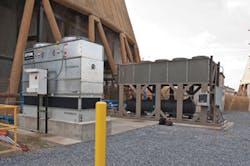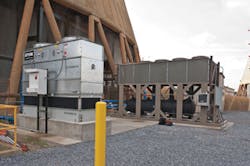Power Plant Project Wins WateReuse Award
CH2M HILL, a global full-service consulting, design, construction, and operations firm, has earned a 2012 WateReuse Award from the WateReuse Association for its work on the Empire Generating Power Plant in Rensselaer, NY.
The WateReuse Awards honor projects and people across the United States and abroad that have made significant contributions to water reuse. The awards typically recognize projects that advance alternative sources of water supply or offer a novel approach to meeting local water needs.
The Empire Generating Power Plant, engineered, procured, and constructed by CH2M HILL, is an environmentally friendly power plant that uses reclaimed water for cooling/process and natural gas to fire the combined-cycle turbines to 535 megawatt base load or 635 megawatt at peaking power-representing the largest beneficial use of treatment plant effluent in New York State.
As a result of the ultra-filtration, demineralization water treatment process, the facility reduces its need for fresh water by up to 4,800 gallons per minute (summer peak rate). The project also included the construction of a low noise and plume-abated cooling tower, a 28-inch diameter grey water pipeline under the Hudson River for non-contaminating effluent flow, and a submerged effluent outflow structure for the reuse of treated water.
Beginning operations in 2010, the Empire Generating Power Plant is one of the nation's cleanest and most efficient combined-cycle plants in the country.
Agreement to Advance Remediation Technologies
KeyEco Tech has entered into a marketing services agreement with Advanced Waste & Water Technology (AWWT), a company that specializes in chemical and liquid waste removal, waste and water treatment and disposal services.
The agreement outlines that AWWT will provide marketing services to commercialize and increase the awareness and use of KeyEco Tech's water remediation technologies. KeyEco Tech, a subsidiary of Green Processing Technologies, is focused on establishing itself in the remediation of contaminated tailings ponds, or areas of refused mining tailings where water borne refuse material is pumped into a pond to allow the separation of solid particles from the water.
Marketing services as listed in the agreement, will include, but are not limited to the contact and solicitation of companies involved in fracking on the Marcellus Shale, governmental municipal water treatment projects and large-scale private water treatment projects.
"The safe disposal and clean up of mine waste, including tailings, is generally recognized as the single largest environmental challenge facing the mining industry worldwide and a major expense for mining companies, which makes the revenue opportunity very large for both KeyEco Tech and Green Processing Technologies," said Stephen D. Cummins, CEO of Green Processing Technologies, Inc.
For more information visit www.greenprocessingtechnologies.net.
Company Creates Clean Energy from Wastewater Residuals
MaxWest Environmental Systems has announced the mechanical completion and successful start-up of its second generation gasification technology, the MaxWest Biosolids Gasification System. The company is a biosolids management and renewable energy company with a commercial process to convert wastewater residuals into clean energy.
The second generation biosolids gasification system, now in operation at MaxWest's Sanford site, employs a proprietary gasifier with an integrated energy recovery process. The system configuration increases throughput by 40 percent and achieves higher energy conversion rates, both of which provide further benefits to customers in the form of improved energy generation and reduced operating costs.
"This new design is a significant step forward in terms of thermal efficiency and reliability of biosolids gasification," said Steve Winchester, CEO at MaxWest Environmental Systems.
The MaxWest gasification facility has served commercial customers since 2009, processing over 23,000 wet tons of biosolids. The proprietary system applies a thermo-chemical conversion of the wastewater residuals to generate thermal energy. This renewable energy is then recovered to reduce or eliminate other energy sources, providing energy savings and biosolids destruction for customers.
Ridgeline Launches Water Storage System
Ridgeline Energy Services, an energy services and water treatment company, has launched its Zero Evaporative Low Impact Storage System, known as ZELISS. The systems are being manufactured at the company's newly opened Deaver, WY.
Designed to be installed by two people using only a field grade forklift, the storage system has the ability to eliminate evaporation, and is integrated with three of Ridgeline's water treatment processes. The main cell of the ZELISS system weighs less than 1300 pounds, and the secondary containment is integral to the design.
The system is engineered to grow in "cells" and can be scaled up to store millions of gallons of water in a 100% sealed system, with an integrated secondary containment system. It can grow and contract in size daily or even hourly, if required, depending on storage demand, and capacities desired.
ZELISS can be heated to temperatures in excess of 90 degrees Celsius, and operate in temperatures below minus 70 degrees Celsius.
The system is substantially less costly to manufacture and install as compared to the common "steel pool" design. It also eliminates the use of cranes and pickers necessary to install older designs.
"Ridgeline will deliver the first ZELISS system to our current customers in Texas, and we will also be utilizing ZELISS in a remediation project in California," said Dennis M. Danzik, Ridgeline Director of Engineering and Operations.
Company Selects Evaporation Technology to Recycle Produced Water
Athabasca Oil Corp. has awarded GE a contract to design and supply an integrated evaporator system for its 12,000 barrels per day Hangingstone oil sands operation located near Fort McMurray in northeastern Alberta, Canada.
The produced water evaporation process will treat produced water from the Hangingstone facility's steam-assisted gravity drainage (SAGD) process, combined with the use of brackish makeup water in lieu of fresh makeup water. The water treatment system will recover 97 percent of the produced water and brackish makeup water fed to the system as boiler feedwater to drive the SAGD process.
"The demand for innovative water treatment technologies that lessen the environmental impact of production facilities while improving project economics continues to increase. We have pioneered and optimized the utilization and efficiency of evaporators and crystallizers in oil sands applications. We are proud to help meet the unique water needs of this industry," said Bill Heins, general manager, thermal systems-water and process technologies for GE Power & Water.
GE's patented produced water evaporation system helps producers minimize water consumption and water disposal, reduce environmental footprint and improve operating efficiencies.
Athabasca's Hangingstone project exemplifies the growing trend of using produced water evaporation systems for greenfield SAGD projects, due in part to the economic and environmental benefits offered by evaporators and drum boilers compared to traditional water treatment and once-through, steam-generation technologies. With the addition of GE's proprietary contaminant reduction system, the technology can produce a high-quality distillate suitable for use as feedwater for high-pressure drum boilers.
GE will be providing Athabasca with two evaporator units, which will include a split sump design for enhanced energy efficiency. The system also will incorporate the company's fifth-generation module design. GE will deliver the equipment to the site in the third quarter of 2013 with commercial operation expected to begin in 2014.
Power Industry Water Research Center Begins Operation
A new technology that could significantly reduce the water needed for power plant cooling is being tested, marking the beginning of research and development at the new Water Research Center (WRC) at Georgia Power's Plant Bowen in Cartersville, Ga.
Cooling water is essential for most thermal, or steam-driven, electric generation, which is the primary form of producing power in the United States and globally. Although most of the water withdrawn for power generation is returned to the source, the energy industry is focused on finding more efficient ways to manage water resources.
The WRC is the first U.S. research facility of its kind, providing a venue for developing and testing technologies to reduce power plant water withdrawals and consumption and improve the quality of water related to power generation. Operated by the Southern Research Institute, the WRC is being developed by Southern Company and its subsidiary Georgia Power, Southern Research and the Electric Power Research Institute (EPRI), which has assembled an R&D collaborative of 13 companies.
"This is the latest demonstration of our commitment at Georgia Power and Southern Company to develop technology solutions for providing safe, clean, reliable and affordable electricity," said Georgia Power Environmental Affairs Vice President Ron Shipman. "The WRC, a first-of-its-kind power generation water research hub at Plant Bowen, is technology leadership at its best."
Evaluation of the new technology - a thermosyphon cooler developed by Johnson Controls - is the first project to become operational at the center. According to Johnson Controls, the technology transfers heat to the environment without evaporative water loss by using an air-cooled refrigerant that pre-cools water before it enters the cooling tower. The thermosyphon cooler reduces the amount of water that must be cooled by evaporation in the cooling tower, thus reducing water consumption. The year-long testing at the WRC will document the technology's water savings potential and energy consumption characteristics.
The Water Research Center is being designed to accommodate development and evaluation of power plant water management technologies in seven areas. These include cooling tower water chemistry and advanced cooling systems; process wastewater treatment; zero liquid discharge options; moisture recovery from power plant processes; solids landfill water management; carbon technology water issues; and water use modeling and monitoring for best management practices.
The technologies being explored at the WRC can be implemented by power companies worldwide to address water issues and also will educate students and community leaders about the importance of water conservation and the technologies being developed to reduce water consumption.
"EPRI is pleased to be working with an industry collaborative that includes so many companies which recognize the importance of this issue of water consumption and the environmental impacts of its use," said Tom Alley, EPRI Vice President of Generation. "Current events of drought and high demands on existing water supplies emphasize the importance of water management."
Joint Venture Targets Shale Gas Wastewater Solutions
Fountain Quail Water Management, a wholly owned subsidiary of Aqua-Pure Ventures, has joined forces with Select Energy Services, a water solutions and oilfield service company, to develop opportunities for wastewater recycling in the North American oil and gas industries.
The new company, FQS Venture LLC, combines a leading recycler of oilfield wastewater with one of the industry leaders in providing water solutions and wellsite services. The joint venture includes an exclusive licensing agreement that gives the venture access to Aqua-Pure's technologies.
Fountain Quail will contribute its equipment and technological expertise to the joint venture, and Select will contribute capital to acquire and/or construct additional recycling equipment. Select will likewise use its best efforts to help Fountain Quail fund its operational obligations, and Fountain Quail will earn a royalty stream from the joint venture.
"This venture with Select Energy gives us access to the investment capital and human resources we need to meet current and projected demand for our state-of-the-art recycling technologies," said Jake Halldorson, Chief Executive Officer of Aqua-Pure Ventures. "Teaming up with a company of Select's size and reach gives us the scale to compete for virtually every project. We fully anticipate that FQS will grow rapidly over the coming months and years."
Fountain Quail's Rover mobile clarifier package is a rugged, in-field technology designed for primary treatment of shale gas flowback at or near the source. The self-contained system, which can treat up to 10,000 barrels of flowback and produced water per day, removes suspended solids and soluble organics from shale gas wastewater and returns clean brine that can be blended for re-use as hydraulic fracturing fluid.
The company's Nomad system is a semi-mobile brine concentrator that uses a distillation process to produce fresh water from the flowback and produced water.
Manufacturers with Integrated Solutions Make Waves in Water Treatment Chemicals Market
The North American industrial water and wastewater treatment chemicals market has always been a fragmented area, with both global and regional participants vying for market share. To stay afloat in this space, participants have gradually evolved from merely supplying chemicals to providing a more integrated solution that includes services and equipment.
New analysis from Frost & Sullivan (http://www.chemicals.frost.com), North American Industrial Water and Wastewater Treatment Chemicals Markets, finds that the market earned revenues of $2.03 billion in 2011 and estimates this to reach $2.79 billion in 2018.
Despite the emergence of alternative modes of water treatment, chemicals will continue to dominate the landscape due to its cost effectiveness.
"The present economic conditions in North America are not conducive for industries to invest heavily in equipment or infrastructure," said Frost & Sullivan Senior Research Analyst Deepak Karthikeyan. "Thus the lower cost and higher performance of chemicals place them at par with the best available technology for treating water."
With freshwater resources depleting and governments stressing the need to conserve and reuse water in industrial processes, end-users are turning to treatment chemicals.
The market's potential has attracted numerous participants, escalating competition not only among chemical manufacturers, but also among various value chain participants that sell solutions. Consequently, some segments in the market have become commoditized, placing pressure on companies to reduce prices to meet customer expectations.
Considering the price sensitivity of the market at present and depressed demand, low-cost imports from Asia also pose a threat to the local manufacturing base in certain segments.
"Companies have to increasingly focus on differentiating themselves through product development and innovation in niche segments rather than compete on price," noted Karthikeyan. "To maintain their dominance, domestic manufacturers need to leverage their advantages such as product quality, strong R&D capability, broader product line, superior customer service, and long-term partnerships with service companies."



